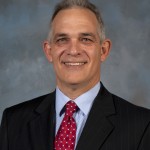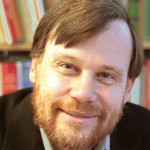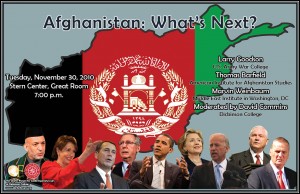Panel Discussion
Tuesday, November 30, 2010
Stern Center, Great Room – 7:00 p.m.
Panelists
Larry Goodson, professor of Middle East studies, U.S. Army War College
Thomas Barfield, professor of anthropology at Boston University and president of the American Institute for Afghanistan Studies.
Marvin Weinbaum, Scholar-in-Residence, Middle East Institute in Washington, DC
Moderated by David Commins, professor of history, Dickinson College
In the context of the Obama Administration’s upcoming review of its policies in Afghanistan, a panel of experts will address the following questions: What are the intensity and depth of U.S. interests in Afghanistan? Are these interests vital to U.S. national security? If the interests are vital, can the U.S. achieve these interests with the existing policy/strategy or is some other policy/strategy required? If the interests are not vital to U.S. national security, why is the U.S. spending so much blood and treasure in Afghanistan?
Biographies (provided by the panelists)
 Larry P. Goodson is professor of Middle East Studies at the U.S. Army War College. He is regularly consulted by senior government officials about Afghanistan, Pakistan, and the Middle East. In 2008-2009 he served on a four-month temporary assignment with the U.S. Central Command Assessment Team, where he focused on U.S. strategy and policy toward Afghanistan and Pakistan for General David Petraeus. As U.S. Central Command Fellow in 2004, he served as a senior adviser to General John Abizaid on Afghanistan and Pakistan. Prof. Goodson held the General Dwight D. Eisenhower Chair of National Security at the U.S. Army War College from 2004 to 2007. In 2002, Prof. Goodson was technical adviser on Elections and one of the International Election Monitors for the Emergency Loya Jirga in Afghanistan.
Larry P. Goodson is professor of Middle East Studies at the U.S. Army War College. He is regularly consulted by senior government officials about Afghanistan, Pakistan, and the Middle East. In 2008-2009 he served on a four-month temporary assignment with the U.S. Central Command Assessment Team, where he focused on U.S. strategy and policy toward Afghanistan and Pakistan for General David Petraeus. As U.S. Central Command Fellow in 2004, he served as a senior adviser to General John Abizaid on Afghanistan and Pakistan. Prof. Goodson held the General Dwight D. Eisenhower Chair of National Security at the U.S. Army War College from 2004 to 2007. In 2002, Prof. Goodson was technical adviser on Elections and one of the International Election Monitors for the Emergency Loya Jirga in Afghanistan.
A leading U.S. academic specialist on Afghanistan and Pakistan, Prof. Goodson has also held teaching appointments at Bentley College, the University of the South, the American University in Cairo, Campbell University, and the University of North Carolina-Greensboro. Prof. Goodson completed all of his academic work at the University of North Carolina-Chapel Hill, graduating with a B.A. in political science and economics in 1980, M.A. in political science in 1984, and Ph.D. in political science in 1990.
Prof. Goodson is the author of the New York Times bestselling Afghanistan’s Endless War: State Failure, Regional Politics, and the Rise of the Taliban (2001) and the forthcoming (2011) Pakistan: Understanding the Dark Side of the Moon. He contributes frequent book chapters and articles to academic journals such as the Journal of the Democracy and Asian Survey, as well as opinion pieces in major newspapers like the New York Times and Baltimore Sun. Dr. Goodson has consulted with numerous U.S. government agencies, government agencies of other countries (such as Canada), inter-governmental organizations (such as the North Atlantic Treaty Organization), and non-governmental organizations. He has lectured on Afghanistan, Pakistan, Islam, and the Middle East to audiences at more than 100 universities, schools, and organizations, and been interviewed more than 1000 times on those subjects since September 11, 2001.
 Thomas Barfield is an anthropologist who conducted ethnographic fieldwork with nomads in northern Afghanistan in the mid 1970s as well as shorter periods of research in Xinjiang, China, and post-Soviet Uzbekistan. He is author of The Central Asian Arabs of Afghanistan(1981), The Perilous Frontier: Nomadic Empires and China (1989) and co-author of Afghanistan: An Atlas of Indigenous Domestic Architecture(1991). Professor of anthropology at Boston University, Barfield is also president of the American Institute for Afghanistan Studies. Since 2001 his research has focused on problems of law and political development in contemporary Afghanistan. In 2007 Barfield received a Guggenheim Fellowship that supported the completion of research for his new book, Afghanistan: A Cultural and Political History (Princeton, 2010).
Thomas Barfield is an anthropologist who conducted ethnographic fieldwork with nomads in northern Afghanistan in the mid 1970s as well as shorter periods of research in Xinjiang, China, and post-Soviet Uzbekistan. He is author of The Central Asian Arabs of Afghanistan(1981), The Perilous Frontier: Nomadic Empires and China (1989) and co-author of Afghanistan: An Atlas of Indigenous Domestic Architecture(1991). Professor of anthropology at Boston University, Barfield is also president of the American Institute for Afghanistan Studies. Since 2001 his research has focused on problems of law and political development in contemporary Afghanistan. In 2007 Barfield received a Guggenheim Fellowship that supported the completion of research for his new book, Afghanistan: A Cultural and Political History (Princeton, 2010).
 Marvin G. Weinbaum is professor emeritus of political science at the University of Illinois at Urbana-Champaign, and served as analyst for Pakistan and Afghanistan in the U.S. Department of State’s Bureau of Intelligence and Research from 1999 to 2003. He is currently a scholar-in-residence at the Middle East Institute in Washington DC.
Marvin G. Weinbaum is professor emeritus of political science at the University of Illinois at Urbana-Champaign, and served as analyst for Pakistan and Afghanistan in the U.S. Department of State’s Bureau of Intelligence and Research from 1999 to 2003. He is currently a scholar-in-residence at the Middle East Institute in Washington DC.
Professor Weinbaum received his doctorate from Columbia University in 1965, and joined the Illinois faculty in the same year. At Illinois, he served for fifteen years as the director of the Program in South Asian and Middle Eastern Studies. Dr. Weinbaum was awarded Fulbright Research Fellowships for Egypt in 1981–82 and Afghanistan in 1989–90, and was a senior fellow at the United States Institute of Peace in 1996–97. Additionally, Dr. Weinbaum has been the recipient of research awards from the Social Science Research Council, the Ford Foundation, the Hewlett Foundation, IREX, the American Political Science Association, and other granting agencies.
After retiring at Illinois, Professor Weinbaum has held adjunct professorships at Georgetown and George Washington universities, and lectures regularly at the U.S. Foreign Service Institute. At the State Department he was a recipient of its Superior Honors Award. Since leaving the Department, he has assumed numerous consultancies with government agencies and in the private sector, both in the US and abroad.
Dr. Weinbaum’s research, teaching, and consultancies have focused on the issues of national security, state building, democratization, and political economy. He is the author or editor of six books, including South Asia Approaches the Millennium: Reexamining National Security, co-edited with Chetan Kumar in 1995, and Afghanistan and Pakistan: Resistance and Reconstruction in 1994. In all, Dr. Weinbaum has written upwards of 100 journal articles and book chapters, mostly about Pakistan, Afghanistan, and Iran, but also on Egypt and Turkey. Among his recent publications are book chapters for edited volumes dealing with the U.S.-Pakistan partnership in counterterrorism, Pakistan’s political culture, state building and security in Afghanistan, the intertwined destinies of Afghanistan and Pakistan, and the politics of human rights in Turkey, Iran, and Afghanistan.
 David Commins is professor of history and the Benjamin Rush Distinguished Chair in Liberal Arts and Sciences at Dickinson College. He teaches courses in the Middle East Studies program and the history department. His publications include Islamic Reform: Politics and Social Change in Late Ottoman Syria (Oxford University Press, 1990), Historical Dictionary of Syria (Scarecrow Press, 1995, revised edition 2004), and The Wahhabi Mission and Saudi Arabia (IB Tauris, 2006).
David Commins is professor of history and the Benjamin Rush Distinguished Chair in Liberal Arts and Sciences at Dickinson College. He teaches courses in the Middle East Studies program and the history department. His publications include Islamic Reform: Politics and Social Change in Late Ottoman Syria (Oxford University Press, 1990), Historical Dictionary of Syria (Scarecrow Press, 1995, revised edition 2004), and The Wahhabi Mission and Saudi Arabia (IB Tauris, 2006).
Video of the Program

